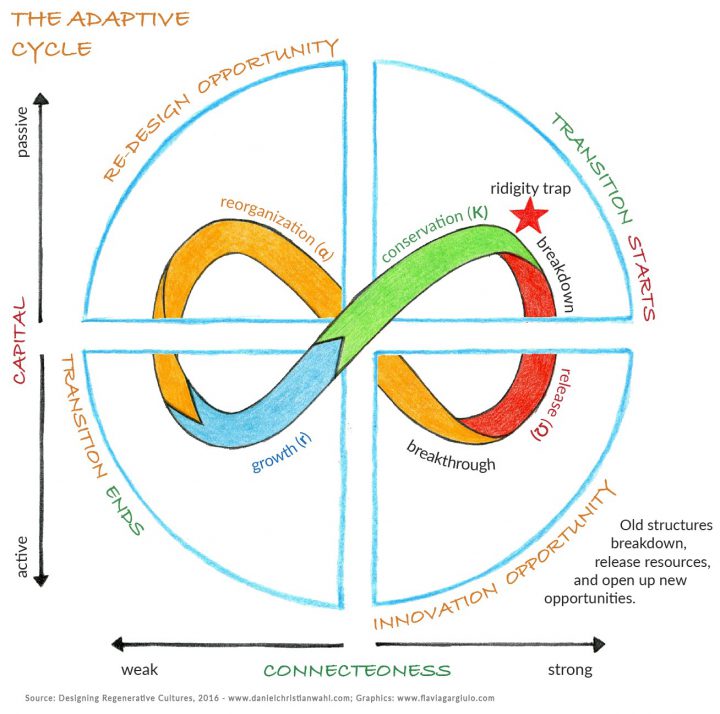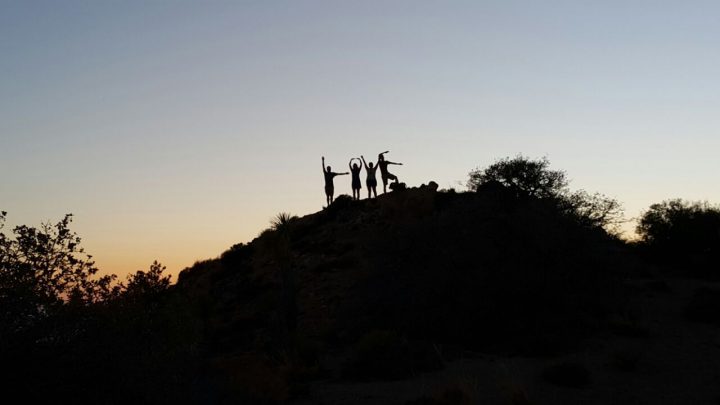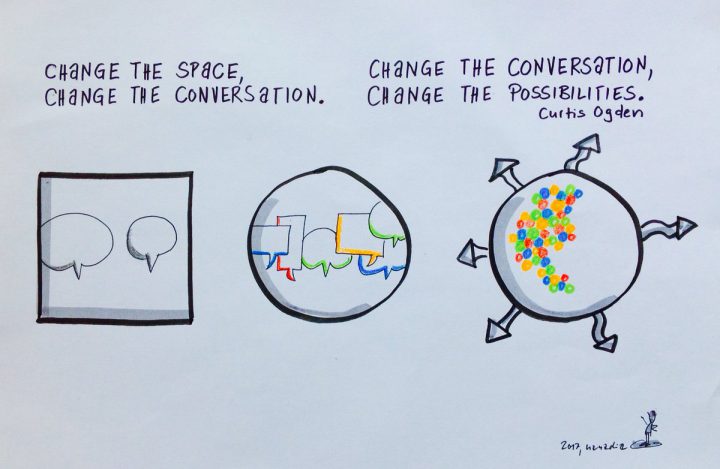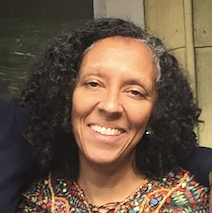Tag Archive: change
December 10, 2018
What makes a fire burn
is space between the logs,
a breathing space.
Too much of a good thing,
too many logs
packed in too tight
can douse the flames
almost as surely
as a pail of water would.
So building fires
requires attention
to the spaces in between,
as much as to the wood.
When we are able to build
open spaces
in the same way
we have learned
to pile on the logs,
then we can come to see how
it is fuel, and absence of the fuel
together, that make fire possible. …
A fire
grows
simply because the space is there,
with openings
in which the flame
that knows just how it wants to burn
can find its way.
– “Fire,” Judy Sorum Brown
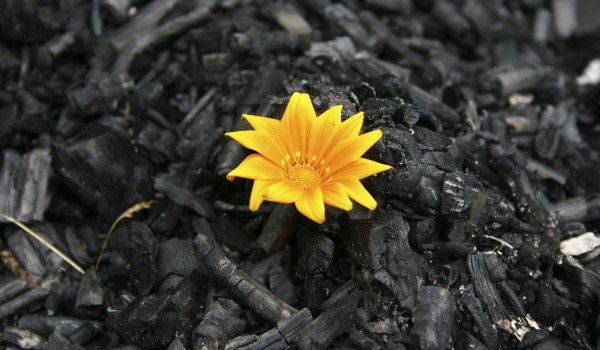
Change does not tend to happen through piling on, through simply adding to what we are already doing or whatever heap we have in front of us.
Change happens, say scientists and sages, through some kind of release, through letting go. Not of everything, but of something. Something that will create enough space for creativity (something else!) to happen.
Changing the way we do work, behave, and treat one another and the planet doesn’t mean dumping new techniques on top of old ways of working. It means carving out creative niches that are given space for the breath of life to reach them. So they can grow. So that they can find their way.
Change does not tend to happen in isolation (the proof of re-treat is ultimately in re-engagement). It happens through connection, through webs (no one is an island). It happens through collective care and nurturing. Too much space – distance, disconnection – can kill the spark of change.
Sharon Salzberg and Ethan Nichtern ask an important question –
“What are we holding onto about this system [ways of doing and being] that, if we trusted the other people around us, we actually could practice letting go of?”
Connection, deep connection, also helps us to let go. … And to let something else come.
Connect. Let go. Create space. Connect. Let come.
Like breathing.
How are you connecting (and to what and to whom) in order to let go of what no longer serves?
What are you letting go of in order to create spaces for the new and desperately needed?
What new connections (and old) are you making to fuel the fires of possibility?
January 3, 2018
“We rise and fall and light from dying embers, remembrances that hope and love last longer
And love is love is love is love is love is love is love is love, cannot be killed or swept aside.”
– Lin Manuel Miranda
We know we are not alone at IISC when we say that 2017 left many of us a bit exhausted and breathless, if not somewhat dumbfounded. What occasionally felt like the wheels coming off of our country’s management and morality caught us by varying degrees of surprise, which is not to say that the underlying frustration and ongoing dynamics of “othering” were necessarily shocking. Rather, the unabashed in-your-face tenor of it all got to points where it was all I could do to stay even minimally tuned in to have at least a fingernail on the pulse of things (but really, there were few places to hide!).
I am grateful that as an organization we take a break at the end of the year to rest, restore and reflect. And while some of us may feel like we could use another week (or two), I for one feel ready and resolved to step boldly into 2018 with an open heart and humble sense of not knowing (what will happen, what is in others’ hearts and minds, what the answers are). I would characterize this as a stance of love or loving kindness. Read More
August 15, 2017
I love Twitter.
On the heels of the Hunts Point Resiliency Collaboration Lab (about which a blog post is forthcoming) that a team of us from IISC facilitated a couple of weeks ago, I tweeted the following –
“Change the space, change the conversation. Change the conversation, change the possibilities.”
Without getting into all of the details, by shifting what might otherwise might have been a typical meeting through the use of art, music, tactile objects, intentional arrangement of seating, delicious food, robust opportunities for interaction, etc., those in attendance acknowledged that we were able to get to authentic and important conversations that many had been eager to have. And these have opened some opportunities about which people are very excited.
My almost off-handed tweet was picked up and retweeted by a few people, including Nadia von Holzen, who then put together the wonderful graphic above and put it back into the Twittersphere. I love the enhancement and contribution. Thanks, Nadia!
This is another example of what can happen when you “think or work out loud.” In this intricately connected world, you never know who is listening and what gifts they stand poised to bring to your humble offerings.
July 25, 2017
“The difficulty we face is that the ecology of the biosphere is at odds with the ecology of our institutions.”
– Nora Bateson
In the past couple of posts, I have referenced Nora Bateson’s book Small Arcs of Larger Circles: Framing Through Other Patterns, a collection of essays, poetry, personal stories and excerpts of talks focused on systems theory and complexity thinking. I just finished the book and have underlined and tweeted a number of provocative lines that resonated and gave me pause (in a good way). Here are a few gems from the book that I continue to contemplate in different contexts:
“The problem with problem-solving is the idea that a solution is an endpoint.”
“Systems theory is struggling inside a system that doesn’t actually accommodate it.”
“We cannot know the systems, but we can know more. We cannot perfect the systems, but we can do better.”
“What does it mean to be healthy in an unhealthy system?”
“No living thing exists in just one context.”
Read More
April 26, 2017
The human heart is the first home of democracy. It is where we embrace our questions. Can we be equitable? Can we be generous? Can we listen with our whole beings, not just our minds, and offer our attention rather than our opinions? And do we have enough resolve in our hearts to act courageously, relentlessly, without giving up – ever – trusting our fellow citizens to join with us in our determined pursuit of a living democracy? ~Terry Tempest Williams
In Turkey, voters just granted the Prime Minister additional powers. In the US, many people have long been fond of simple solutions. Today that plays out with support of a bombast who is inconsistent and offers solutions that exacerbate underlying problems.
When we work with clients, it also seems like there is a pull to simplicity, especially around issues of diversity and equity.
We field many calls from organizations and networks eager to address issues of racism. In its caricature state, which is all too common, the request is for a two-hour workshop for staff. The hope is that with a few hours of filling smart brains with a new understanding—of the history of racism, or of implicit bias, or levels of oppression—that then things will be okay.
This is false. A two-hour workshop can open some new understanding or potentially be used to make a case for change, but in no way does not even put you on the road to okay.
How is it that smart people believe that a little more in the way of “smarts” will undo a complex historical reality routed in policy, cultural narrative and economics?
Some of it seems to be a wish for easy and for ease. Many white people want the magic bullet or the easy solution to our own racism and that of our country and our organizations. We are not used to acknowledging that it took a lot of work to dig the hole that we are in and that it will take even more work to get out. Hoping that two hours or one day can give a diverse group the knowledge, tools, and understanding to create systemic change is simply a wish for simple.
In addition, there are systems that support the quest for this to be simple. For example, funders may offer relatively small dollars for organizational change efforts or not prioritize learning about systems of oppression at all. The push is almost always for fast outcomes and it seems risky to slow down and support the harder efforts that will ultimately be successful. Many leaders of our organizations, foundations, and government institutions have ourselves benefitted from the structures of racism and are content (wittingly or unwittingly) not to rock the boat.
For people working on systemic change, our job is to communicate that change is both hard and worthy. To want change requires more than a workshop; it is a commitment to put in the time, the dollars, and the effort. We know that effective equity efforts require work on multiple levels.
It may not be easy but it is fun and powerful to see the changes along the way. Change can beget more change. Change includes:
- New and deep relationships that expand what is possible and build new ways of being
- More equitable hiring and purchasing policies, investing in long term economic change
- Policies in an organization that are constructed to undo the bias that is both implicit and explicit in our minds and our organizations.
I will write more in the coming weeks about examples of change as a motivation for those moments when we think oppression, racism, and inequity are solvable in a two-hour workshop. IISC is interested in working with groups that choose to avoid the simple and invest with their hearts and time the work that can lead to meaningful change.
July 28, 2015

Just coming off of co-delivering a 2 day Pathway to Change public workshop at IISC with Maanav Thakore, and I’m continuing to think about how important context is to the work of social change. In particular, I’m thinking about how seeing the foundation of all change efforts as being fundamentally networked can yield new possibilities throughout the work. There is the change we plan for, and the change that we don’t plan for and perhaps cannot even imagine – emergence. This is the stuff of networks, of living systems, of decentralized and self-organized activity, which can be encouraged and supported but not often predicted or controlled. And that’s not necessarily a bad thing.
How do I have to be for you to be free?
Read More
September 30, 2014
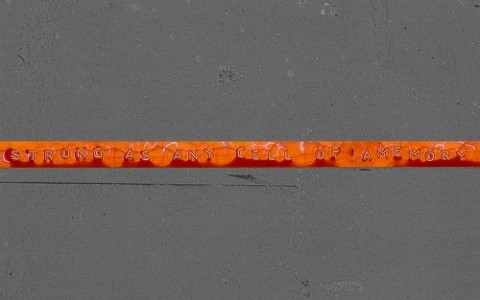
I have a practice in most of the networks and collective impact efforts I support, which is to offer poetry at the opening and closing of convenings. I’m struck by how impactful and important people have said this can be for them. In fact, just recently a very well-respected member of the public health community was compelled to say that this is exactly what is missing from the movement, more poetry and artistic expression!
“Poems come out of wonder, not out of knowing.”
-Lucille Clifton
Read More
September 3, 2014

Photo credit: Boston Globe
Sadly, I am writing yet another memorial post, in a summer that has seen too much tragedy. This weekend, Boston laid to rest Dawnn Jaffier. By all accounts, she was a remarkable young woman who lived a life of service and love. Over the past several days, many young people have testified to Dawnn’s positive influence on their lives and many promised to continue to live as she lived, investing in the lives of young people. This time, death came at the hands of an 18 year-old young black man, allegedly bent on retaliation. Jaffier was innocently caught in the crossfire. While some are calling for an end to the festival and parade that provided the backdrop for this tragedy, I think her death cries out for renewed efforts to intervene in the complex system of internalized oppression – a system that cultivates within black people ourselves a belief in the marginal value of black life – and in a system of structural racism that allows gun trafficking to flourish despite the costs and continues to lock too many men of color out of the kinds of opportunities that could compete with the call of the streets. Dealing with either side of the equation without the other seems a fruitless endeavor.
July 18, 2014

We partnered with a foundation as they built a network of leaders who shared a deep passion for their city. In the beginning, many of the leaders wanted to do something together quickly. We encouraged them to pause, build deeper relationships, and see what emerged. Read More
May 21, 2014

Photo by Waqas Mustafeez
A question I find myself asking quite a bit of those with whom I am doing network building and collaborative change consulting is some version of, “So whose party is this?” A change or developmental initiative may be born in the mind of a single person or small group of people. And she/he/they invite others to that party, her/his/their party. Then over time, the idea may arise on the part of the invitees that this isn’t just “your” party, but “ours” (collectively). This may not come up so much as a direct statement but through questions about and behavior around power dynamics, how the effort is framed, who to engage, etc. Now what? Depending upon the goal, sometimes your party needs to stay your party, and sometimes it needs to shift, through the emergence of a better question or opportunity. Of course, people may make the decision for you by taking the party with them. Or maybe there are two (or more) parties that ensue, in which case, the question becomes, if you are still welcome, “So whose party am I at right now?” The question is not simply meant to be about ownership, but intent, transparency and equity, and how people can show up in value-adding ways.
May 14, 2014
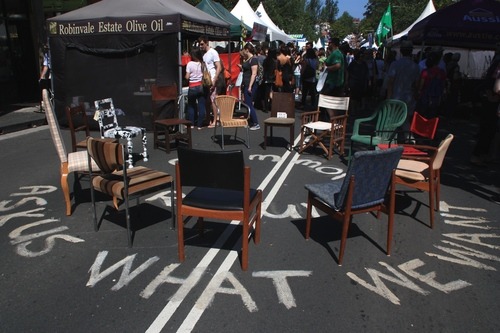
In a number of the social change networks that I am supporting there is very active and interesting conversation, and experimentation, going on around what I would call the process-action tension. As I have written elsewhere, I see this as a bit of a false and often unhelpful dichotomy, and I have certainly seen and been part of networks that have gotten bogged down in some version of analysis paralysis and never-ending consensus building. Increasingly there is a leaning towards getting out there sooner than later and trying things, learning from experiments and actions, readjusting, etc., which is all well and good. At the same time, I see it as part of my role to raise questions about how the embrace of “do-acracy” might have unintended consequences around long-term alignment as well as sustained and truly systemic impact. Read More
April 1, 2014
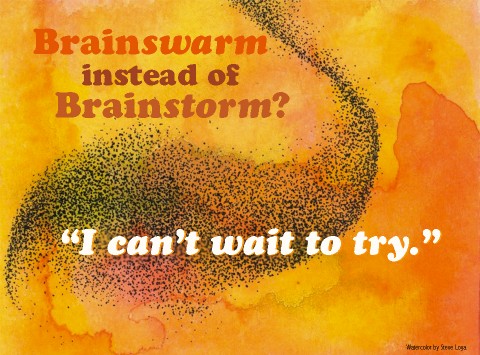
The recent barrage against the effectiveness of brainstorming has been a bit hard for those of us who are grounded in the Interaction Method. But evidence matters, doesn’t it? I know that Curtis has talked about the limits of brainstorming a couple of times in this blog. Read More


